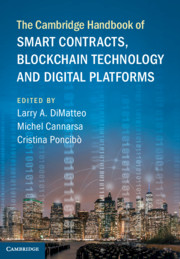Book contents
- The Cambridge Handbook of Smart Contracts, Blockchain Technology and Digital Platforms
- The Cambridge Handbook of Smart Contracts, Blockchain Technology and Digital Platforms
- Copyright page
- Dedication
- Summary of Contents
- Contents
- Contributors
- Preface
- Part I General Framework
- Part II Contract Law and Smart Contracts
- Part III Electronic Platforms and Networks
- 8 Digital Platforms
- 9 Blockchains
- 10 Regulating Smart Contracts and Digital Platforms
- Part IV Privacy, Security and Data Protection
- Part V Smart Contracts
- Part VI Future of Smart Contracts, Blockchain and Artificial Intelligence
9 - Blockchains
A Technology for Decentralized Marketplaces
from Part III - Electronic Platforms and Networks
Published online by Cambridge University Press: 25 October 2019
- The Cambridge Handbook of Smart Contracts, Blockchain Technology and Digital Platforms
- The Cambridge Handbook of Smart Contracts, Blockchain Technology and Digital Platforms
- Copyright page
- Dedication
- Summary of Contents
- Contents
- Contributors
- Preface
- Part I General Framework
- Part II Contract Law and Smart Contracts
- Part III Electronic Platforms and Networks
- 8 Digital Platforms
- 9 Blockchains
- 10 Regulating Smart Contracts and Digital Platforms
- Part IV Privacy, Security and Data Protection
- Part V Smart Contracts
- Part VI Future of Smart Contracts, Blockchain and Artificial Intelligence
Summary
This chapter seeks to discredit the popular belief that blockchains will revolutionize or disrupt commerce. More specifically, it aims to clarify that blockchains as such cannot serve as a technology or ideology for the decentralization of online marketplaces. To this end, the chapter examines the interrelated concepts of decentralization, disintermediation, trustlessness, and immutability. It is necessary to understand what those terms actually mean and how they affect actual, commercial practices. The chapter commences with a broad description of blockchains and introduces the important division between public and private blockchains, to demonstrate that only the latter could potentially serve as a technology that could provide a user-friendly and secure transacting environment. It confronts the practical implications of decentralization, focusing on the fact that the absence of formalized control usually translates into an absence of formalized governance processes.
Keywords
- Type
- Chapter
- Information
- The Cambridge Handbook of Smart Contracts, Blockchain Technology and Digital Platforms , pp. 160 - 182Publisher: Cambridge University PressPrint publication year: 2019
- 4
- Cited by

